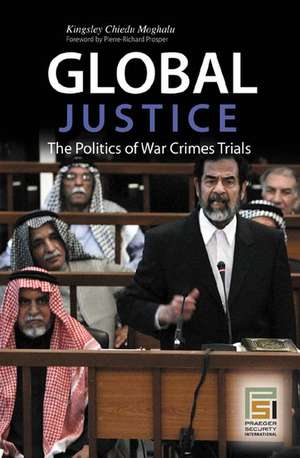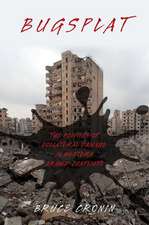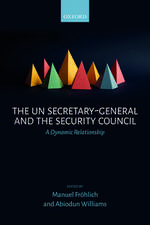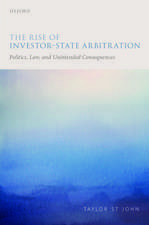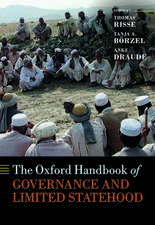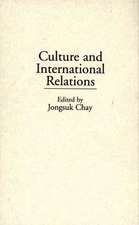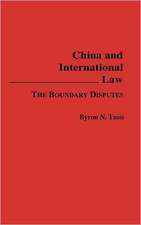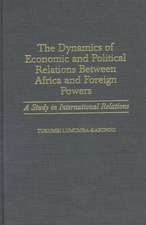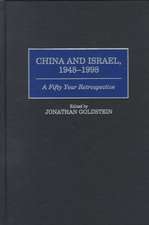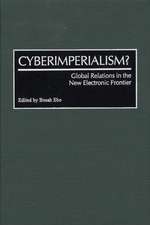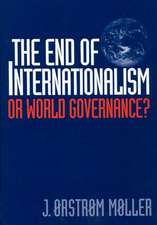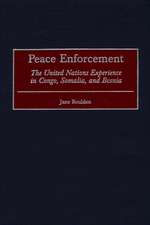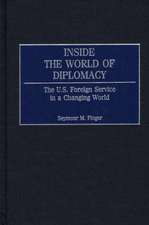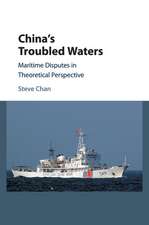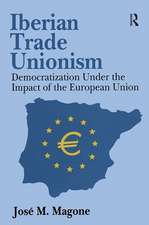Global Justice: The Politics of War Crimes Trials: Praeger Security International
Autor Kingsley Chiedu Moghaluen Limba Engleză Hardback – 29 oct 2006 – vârsta până la 17 ani
Din seria Praeger Security International
- 18%
 Preț: 334.19 lei
Preț: 334.19 lei - 8%
 Preț: 335.53 lei
Preț: 335.53 lei - 34%
 Preț: 376.10 lei
Preț: 376.10 lei - 46%
 Preț: 443.64 lei
Preț: 443.64 lei - 29%
 Preț: 240.11 lei
Preț: 240.11 lei - 8%
 Preț: 304.56 lei
Preț: 304.56 lei - 34%
 Preț: 373.82 lei
Preț: 373.82 lei - 19%
 Preț: 412.79 lei
Preț: 412.79 lei - 19%
 Preț: 338.42 lei
Preț: 338.42 lei - 18%
 Preț: 335.62 lei
Preț: 335.62 lei - 27%
 Preț: 377.35 lei
Preț: 377.35 lei - 27%
 Preț: 376.75 lei
Preț: 376.75 lei - 18%
 Preț: 336.46 lei
Preț: 336.46 lei - 18%
 Preț: 321.73 lei
Preț: 321.73 lei - 27%
 Preț: 384.51 lei
Preț: 384.51 lei - 18%
 Preț: 320.50 lei
Preț: 320.50 lei - 18%
 Preț: 320.50 lei
Preț: 320.50 lei - 18%
 Preț: 321.35 lei
Preț: 321.35 lei - 24%
 Preț: 420.54 lei
Preț: 420.54 lei - 14%
 Preț: 335.99 lei
Preț: 335.99 lei - 18%
 Preț: 355.82 lei
Preț: 355.82 lei - 18%
 Preț: 319.83 lei
Preț: 319.83 lei - 18%
 Preț: 334.28 lei
Preț: 334.28 lei - 32%
 Preț: 354.48 lei
Preț: 354.48 lei - 14%
 Preț: 335.14 lei
Preț: 335.14 lei - 38%
 Preț: 405.98 lei
Preț: 405.98 lei - 40%
 Preț: 571.34 lei
Preț: 571.34 lei - 18%
 Preț: 321.85 lei
Preț: 321.85 lei - 18%
 Preț: 323.25 lei
Preț: 323.25 lei - 18%
 Preț: 253.28 lei
Preț: 253.28 lei - 40%
 Preț: 571.50 lei
Preț: 571.50 lei - 14%
 Preț: 333.72 lei
Preț: 333.72 lei - 18%
 Preț: 301.73 lei
Preț: 301.73 lei - 19%
 Preț: 352.96 lei
Preț: 352.96 lei - 26%
 Preț: 387.80 lei
Preț: 387.80 lei - 18%
 Preț: 302.77 lei
Preț: 302.77 lei - 14%
 Preț: 333.91 lei
Preț: 333.91 lei - 17%
 Preț: 325.80 lei
Preț: 325.80 lei - 24%
 Preț: 338.58 lei
Preț: 338.58 lei - 34%
 Preț: 414.73 lei
Preț: 414.73 lei - 18%
 Preț: 354.30 lei
Preț: 354.30 lei - 29%
 Preț: 254.29 lei
Preț: 254.29 lei - 18%
 Preț: 354.11 lei
Preț: 354.11 lei - 18%
 Preț: 334.38 lei
Preț: 334.38 lei - 14%
 Preț: 302.68 lei
Preț: 302.68 lei - 18%
 Preț: 322.97 lei
Preț: 322.97 lei - 27%
 Preț: 376.50 lei
Preț: 376.50 lei - 27%
 Preț: 322.81 lei
Preț: 322.81 lei - 27%
 Preț: 382.91 lei
Preț: 382.91 lei - 18%
 Preț: 320.87 lei
Preț: 320.87 lei
Preț: 321.85 lei
Preț vechi: 453.37 lei
-29% Nou
Puncte Express: 483
Preț estimativ în valută:
61.59€ • 65.86$ • 51.35£
61.59€ • 65.86$ • 51.35£
Carte tipărită la comandă
Livrare economică 17 aprilie-01 mai
Preluare comenzi: 021 569.72.76
Specificații
ISBN-13: 9780275992972
ISBN-10: 0275992977
Pagini: 240
Dimensiuni: 156 x 235 x 23 mm
Greutate: 0.51 kg
Editura: Bloomsbury Publishing
Colecția Praeger
Seria Praeger Security International
Locul publicării:New York, United States
ISBN-10: 0275992977
Pagini: 240
Dimensiuni: 156 x 235 x 23 mm
Greutate: 0.51 kg
Editura: Bloomsbury Publishing
Colecția Praeger
Seria Praeger Security International
Locul publicării:New York, United States
Notă biografică
Kingsley Chiedu Moghalu, PhD, recently served as a member of the Redesign Panel on the United Nations Internal Justice System appointed by the Secretary-General as part of the reform of the United Nations and was formerly Legal Adviser to the International Criminal Tribunal for Rwanda, which he represented in negotiations that led to the establishment of the International Criminal Court. He has also worked for the United Nations in New York, Cambodia, the former Yugoslavia, and Geneva. He is the author of Rwanda's Genocide: The Politics of Global Justice (2005). His op-ed commentaries have appeared in the Washington Post, International Herald Tribune, Legal Times, New Perspectives Quarterly, and other publications.
Cuprins
Foreword by Pierre-Richard ProsperPrefaceAcknowledgments1. War Crimes Justice in World Politics2. Prosecute or Pardon?3. The Balkans: The Trial of Slobodan Milosevic4. The Rise and Fall of Universal Jurisdiction5. Sierra Leone: Judging Charles Taylor6. The Politics of the International Criminal Court7. Iraq: Chronicle of a Trial Foretold8. International Justice: Not Yet the End of HistoryNotesSelected ResourcesIndex
Recenzii
Two legal concepts, erga omnes, essentially universal application, and hostis humanis generis, referring to crimes against humanity, combined with a concern for human rights that emerged after WW II and the Nuremberg and Tokyo war tribunals, has resulted in the international legal community bringing to bear increased attention to the treatment of war criminals. This is the attention the author, a UN diplomat and a legal adviser to the International Criminal Tribunal for Rwanda, brings to bear. His thesis is clear: while there has been an attempt to globalize justice, in the end international tribunals are vehicles for major states' ends. The historical precedents established in Europe and Asia, the author details, have been replayed with trials for war-related activities in the Balkans and Rwanda, followed by a similar tribunal in Sierra Leone and indictments against former Liberian leader Charles Taylor. However, in the case of Iraq and its former president, Saddam Hussein, international proceedings were not undertaken. Instead, a national war-crimes court operating under the aegis of US occupation claimed jurisdiction. In the end, the author concludes, national sovereignty reigns supreme in war crimes, despite attempts at the internationalization of justice. Recommended. Upper-division undergraduates through practitioners.
Rather than take an advocacy position towards war crimes trials, Moghalu seeks to provide a non-scholarly audience with an understanding of the international political context of war crimes trials, portraying it as the playing out of the conflict of between globalization and sovereignty. He traces the development of international war crimes trials from their foundations in the Nurember and Tokyo trials after World War II, going on to discuss tribunals for the former Yugoslavia, Rwanda, Sierra Leone, along with the establishment of the International Criminal Court. He concludes with recommendations on how to address power imbalances that currently influence the system of international justice.
Anyone interested in the issues of humanitarian law in general, and war crimes prosecution in particular, will want to consider Global Justice: The Politics of War Crimes Trials, which examines underlying motivations of war crimes trials and considers the social and political forces which influence justice and decision-making processes. Students of international law, in particular, will find Global Justice packed with illustrative examples and thoughtful reflections on the international legal processes with respect to war crime prosecutions and the development of an internationally sanctioned judicial system to try them.
Rather than take an advocacy position towards war crimes trials, Moghalu seeks to provide a non-scholarly audience with an understanding of the international political context of war crimes trials, portraying it as the playing out of the conflict of between globalization and sovereignty. He traces the development of international war crimes trials from their foundations in the Nurember and Tokyo trials after World War II, going on to discuss tribunals for the former Yugoslavia, Rwanda, Sierra Leone, along with the establishment of the International Criminal Court. He concludes with recommendations on how to address power imbalances that currently influence the system of international justice.
Anyone interested in the issues of humanitarian law in general, and war crimes prosecution in particular, will want to consider Global Justice: The Politics of War Crimes Trials, which examines underlying motivations of war crimes trials and considers the social and political forces which influence justice and decision-making processes. Students of international law, in particular, will find Global Justice packed with illustrative examples and thoughtful reflections on the international legal processes with respect to war crime prosecutions and the development of an internationally sanctioned judicial system to try them.
